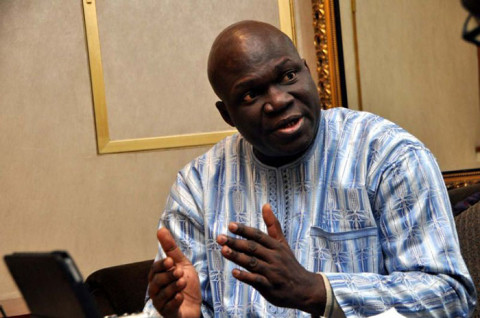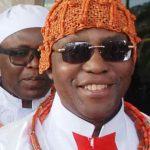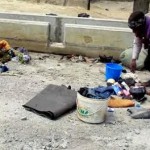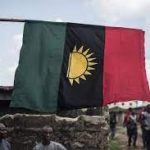2019: A Brief Manual Of Nigerian Politics, By Reuben Abati
Articles/Opinion, Featured, Featured Contributors/Columnists, Latest Headlines Tuesday, September 11th, 2018
(AFRICAN EXAMINER) – The political primaries are scheduled to hold between this month and the next and definitely by the end of October 2018, the hustling and jostling in Nigeria’s political arena would have begun in full earnest. The elections will be held in February 2019. For the benefit of any outsider who may never have witnessed Nigeria’s general elections, the type that is ahead, I offer in this brief note, a description of what to expect, what is already happening in the context of the character, content and style of Nigerian politics, what will happen and what may happen after the elections.
Note this: Very few Nigerian politicians would easily admit that they are in pursuit of their own vaulting ambition, with an eye on profitable return on investment. They are likely to tell you that they are in the race, because they have been approached by members of their community, or certain interest groups to seek elective office, to seek another term, because they are so good, so indispensable that either the constituency or the people will have problems should they decline. “My people asked me to do this…” is a common refrain in Nigerian politics. To cite a familiar example, President Muhammadu Buhari has been told that there is no “alternative” to him in this country of about 200 million people, by the people who surround him. And he believes them!
For years, we have therefore had too many unwilling candidates who were pushed into public office, not because they had anything to offer but because other people found them useful. There are others who are in politics and who actually go on to win elections just because they have an influential parent, a powerful Godfather, or a sellable family name, or enough war-chest to buy everyone that is available for purchase in the electoral value-chain. In the majority however, you will find those who will claim that they are responding to a Divine call. They have been told by a pastor (especially a General Overseer of one of these miracle-dispensing churches) or an imam (sorry a Sheik in Mali, Senegal, Niger, Guinea Bissau, and in-country, a Sheik in Ilorin, Osogbo, Bauchi, Maiduguri). They all rely on these pastors or imams or the covenants that they enter into in fraternities and cults.
Election season is boom-time for these Nigerian spiritualists and the others our politicians consult overseas. A Nigerian election is not only a do-or-die battle on the physical plane, it is spiritual war. It is time for the spiritualists to eat. And they have started by telling their clients that they are the anointed ones of God. I am not making this up. These merchants of electoral victory are on the internet, especially You Tube, using technology to dispense the gospel. They claim to know who will be the next President or that next Governor or lawmaker; they manage to give only such vague hints that would draw the politicians to their doorsteps. If the politician is a newcomer to the game, there are consultants who claim to know the best pastors and imams, and in case you have not noticed, this is that type of season when prayer mountains, night vigils and special prayer rooms have become extra-ordinarily busy. Every election season, sacrifices are offered – someone who should know has said that there are more cases of kidnapping whenever Nigeria goes to the polls – human beings are offered as sacrifices to all kinds of small gods.
It is all about money and power. The spiritualists are bound to remain in charge before, during and after the elections. Spiritualists dictate the manner of governance and politics in more ways than you can ever imagine. If you disagree, please argue with the paper you are holding or your laptop or ipad, or phone. One spiritualist somewhere in Anambra state recently reported that he was attacked and his car and his body were riddled with bullets. He came out of that encounter unscathed. According to him, the bullets could not penetrate his body. In the Nigeria that I know, and given the season that we are in, that was an excellent marketing strategy. You may not believe the man of God, but he will receive visitations from hundreds of politicians and their thugs who devote substantial time and attention to the search for spiritual fortification. In this same country, one famous politician used to go about with a live tortoise strapped around his neck, nestling comfortably under his agbada! We are in the age and season of bullet-proof, miracle-seeking politicians.
Money. This is an important part of the game. The extant Electoral Act (2010) in Nigeria is very specific about campaign finance and the exact amount that a politician is allowed to spend to seek particular offices, the source of the money, the exact amount that can be contributed by entities or individuals to campaigns and the general role of money in Nigerian elections. The law states that a presidential candidate can only spend a maximum amount of N1 billion, a governorship candidate, N200 million, a senatorial candidate, N40 million, House of Representatives candidate, N20 million, State House of Assembly, N10 million, chairman of local government, N10 million, and councillorship, N1 million. Campaign finance regulations are the most abused in Nigerian elections. The aspirants and candidates do what they like, the regulatory authorities look the other way, before, during and after elections. It is all about money on all sides. Election time is an opportunity for every one involved in the election value-chain to make money. There are some candidates who will be honest enough to say that they sold their houses and vehicles and shares and other possessions to be able to get involved in the process. But there are others who will disclose that they are so broke they have had to take bank loans. And there are others who will claim that they had to go cap in hand to their friends and associates to help them out with funds. There is something common to them all: they incur debts ahead of the election. Should they be lucky enough to win, they have to settle the IOUs that brought them to power. This is the root of corruption in Nigeria that has not yet been addressed. If persons are allowed to violate the electoral law on campaign finance, and get away with it, they will do worse. The rule of law is violated; personal interest is allowed to pre-dominate.
We have just such a case before us right now. The President of Nigeria, Muhammadu Buhari is reportedly so cash-strapped he cannot afford to pay the N45 million required for the purchase of the Expression of Interest Form and Nomination Form for the presidential election in his party, the All Progressives Congress (APC). In 2014, he reportedly took a bank loan to busy the same forms. Nobody has told us whether he has paid off that loan or not, but this time around, one entity has stepped in to buy the forms on the President’s behalf. This is clearly in violation of the Electoral Act, subsection 91(9) thereof. Some kind of solipsistic interpretation has been given by APC lawyers but it is not the duty of lawyers to interpret the law so they might as well just keep quiet. I don’t also want to get into that moral argument about whether or not President Buhari should accept the forms. If nobody invokes the law, and tests it, he will collect those forms and nothing will happen. And there are perhaps others like him at other levels, who may collect favours and gifts far in excess of what the law allows. The law is an ass; it doesn’t behave like one except you refuse to push it.
The law on campaign finance in Nigeria is dead anyway because the entire process is monetized. If you are a Nigerian politician, and you want to be something as small as a councillor (a friend tells me that Councillors are big but I don’t believe him), you will need to find money to start feeding the community, months before the primaries or the election, you have to show up at naming, wedding and funeral ceremonies, pay school fees, hospital bills, send lawyers to police stations to help sort out matters ranging from robbery to wife battery. Every day, in your house, a cow must be slaughtered and food must be provided for every one that walks through the gate. You also have to buy motorcycles, bicycles and help fund the acquisition of third or fourth wives. A man who seeks elective office in Nigeria is a victim, to tell the truth. When his constituents deliver triplets, he is the one that will be called the father of the triplets even if he didn’t enjoy the sweaty, ha-oh- yes! – yes-oh-yes!- you-want-to-kill-somebody- privileges that led to the surplus harvest. And he is expected to pick up the bills.
The Nigerian politician needs thugs, also known as able-bodied-men. Because violence is prevalent and we are beginning to see the signs, every major Nigerian politician builds up his or her squad of thugs, who are conveniently labelled supporters. Their requirements are minimal. They need smoke, instruments and money and they are ready to do whatever it takes to protect their master. To understand Nigerian politics, please find out the meaning of “smoke and instruments” and the role that they play in our context. The Nigerian politician also must look the part. He has to dress well. He must surround himself with a beautiful wife or wives. When the wives are not available, the girls around him must meet certain expectations and the electorate will yell: Oga sir! The Nigerian electorate are children of illusions: they tend to believe what they see. When they are disappointed later, they complain that politicians are bad people. They always forget that they caused the problem in the first place. They sell their stomachs before election day, they sell their votes on election day and they sell their conscience after the election. And the politicians exploit all the shortcomings.
Nigeria continues to fail, because the first thing the politician does is to seek returns on his investments: he wants all the money he has spent on thugs, parties and girls back. The last thing he remembers is his duty to the people. The people, as far as he is concerned have collected their own returns upfront. He wouldn’t need them until he needs their votes again. I have given this broad portrait to paint a picture of where Nigerian politics is, and to all aspiring office seekers, including the experienced ones, I offer the following simple instructions, cynically, but we must together respect what the facts say:
- To win elections in Nigeria, you need spiritualists, thugs and money
- You need thugs and spiritualists because your life is not safe. You can get killed by assassins, sent by your opponents who also want the same position.
- You need money because that is what it is all about. Once you declare your interest in politics, every one around you is likely to believe that you have saved some money aside, or stolen some money, or you have rich Godfathers who have given you money, and you are stupid enough to throw it around, and that only a gambler goes into politics. They want their own share of what you have.
- You need the spiritualists because your opponents, believe it or not, will take your name everywhere to their own spiritualists and their minimum objective is to destroy you, or well, stop you.
- Don’t ever make the mistake of eating outside. Important political figures in Nigeria do not eat outside. They pretend to be fasting. If you see any Nigerian politician, eating and talking anyhow at a public forum, ignore him, he is not yet ready. He is planning to move from depression mode to suicide.
- The law says thugs are not allowed. The tradition is that every politician has a small team of able-bodied men. The state security agencies can’t protect you. Get your own men, and get lawyers too. Lawyers want to chop too. They will help you protect the thugs.
- If you can help it, keep your wives and children out of the fray. Your opponents will make them an issue if you throw them into the game.
- Beware of the consultants. Many of them will come to you. They know everything. They worked with that Governor and that Senator and they know everything about the media and the field of politics. Just be careful. Politics is about strategy but half the strategists out there are fake.
- By all means, pray. Pray hard. You may not win, but if you are alive, you may try again. And don’t be squeamish about this: in Brazil, one imbecile called Adelio Bispo de Oliveira put a knife through a Presidential aspirant’s stomach and nearly killed him. In Nigeria, the situation could have been worse. Seek to be a winner, not a martyr.
- Like the Boys’ Scout, be prepared…
This is my advice to you: my short manual on Nigerian politics. There is a longer version where this came from.
Related Posts
Short URL: https://www.africanexaminer.com/?p=45818






















